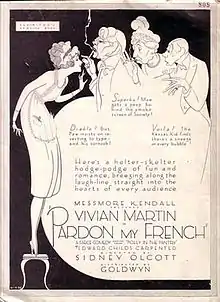Pardon my French
"Pardon my French" or "Excuse my French" is a common English language phrase ostensibly disguising profanity as words from the French language. The phrase is uttered in an attempt to excuse the user of profanity, swearing, or curses in the presence of those offended by it, under the pretense of the words being part of a foreign language.[1] Although the phrase is often used without any explicit or implicit intention of insulting the French people or language, it can nevertheless be perceived as offensive and belittling by Francophone speakers.[2] However, most users of the term intend no such belittlement, but rather a light-hearted way of apologizing on-the-fly for having used a somewhat profane comment. In other words, it can be (and usually is) used as a very effective oral English device to indicate that the speaker does not intend to escalate the general level of profanity use.
Usage
At least one source[3] suggests that the phrase "derives from a literal usage of the exclamation. In the 19th century, when English people used French expressions in conversation they often apologized for it – presumably because many of their listeners (then as now) wouldn't be familiar with the language". The definition cites an example from The Lady's Magazine, 1830:[4]
Bless me, how fat you are grown! – absolutely as round as a ball: – you will soon be as embonpoint[note 1][3] (excuse my French) as your poor dear father, the major.
The phrase has been used in broadcast television and family films where less offensive words are preceded by "pardon my French" to intensify their effect without violating censorship or rating guidelines. An example is in the movie Ferris Bueller's Day Off. Cameron calls Mr. Rooney and says, "Pardon my French, but you’re an asshole".[5]
Related expressions

Incidentally, several expressions are used by both the English and the French to describe the same culturally unacceptable habit, but attributing the habit to the other people:
- "to take a French leave" (to depart a party or other gathering without taking polite leave of one's host) is referenced in French as filer à l'anglaise (lit. "leave English-style").[6]
- "French letter" (now somewhat archaic; referring to a condom) is rendered in French as capote anglaise ("English hood" or "English cap").[7][8]
- During the 16th century in England, genital herpes was called the "French disease" and "French-sick" was a term for syphilis, while in France, it was called le Mal de Naples (the Napoli disease), after the syphilis outbreak in 1494/1495 while French troops were besieging Naples (History of syphilis, Syphilis).
- "French kiss" (A "kiss with the tongue" stimulates the partner's lips, tongue and mouth) is referred in french une pelle (lit. "a shovel").
Notes
- Embonpoint is French for "plumpness"; state of being well-nourished.
References
- Rory T. Cornish, Margueritte Quintelli-Neary, Phrases.org.uk: "Crafting Infinity: Reworking Elements in Irish Culture", Cambridge Scholars Publishing, 2013
- Marie Treps, "Oh là là, ces Français ! Du pire au meilleur, comment le monde parle de nous." La Librairie Vuibert, 2016
- Phrases.org.uk: "Excuse my French"
- Frances White, Why do we say "Excuse my French"? on historyanswers.co.uk, 11 March 2015
- Melissa, How the Tradition of Saying "Pardon My French" After Saying Swear Words Started, on todayifoundout.com, October 8, 2013
- Geraldine Jones, "Excuse my French!" and other popular European sayings, on everywordcounts.co.uk, May 14, 2016
- Matt Soniak, Why Do We Say "Pardon My French" When We Curse?, on mentalfloss.com, October 26, 2012
- Twelve 'French' things that aren't actually French at all, on thelocal.fr, 19 August 2016